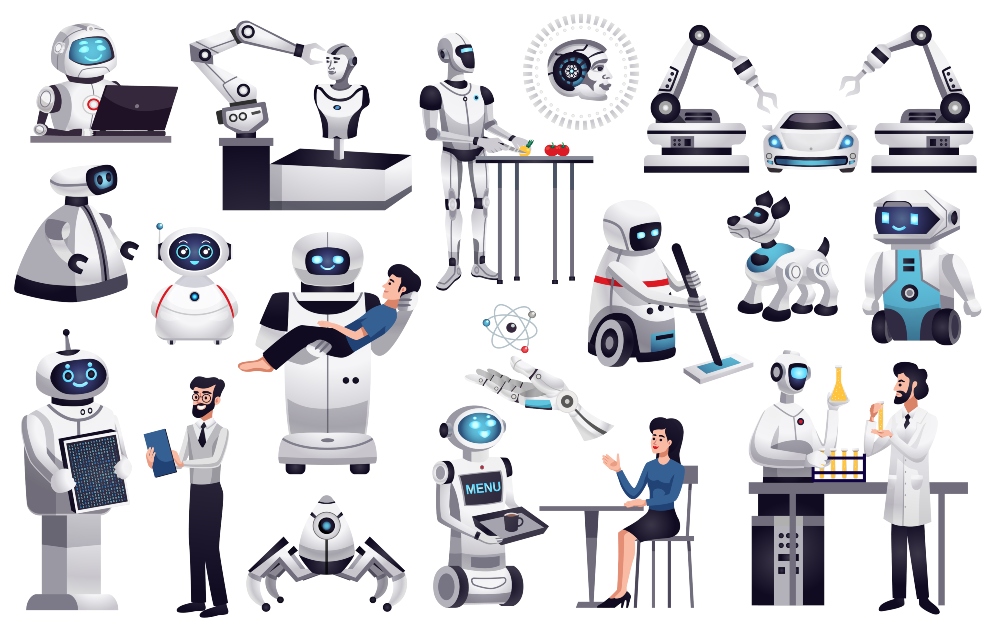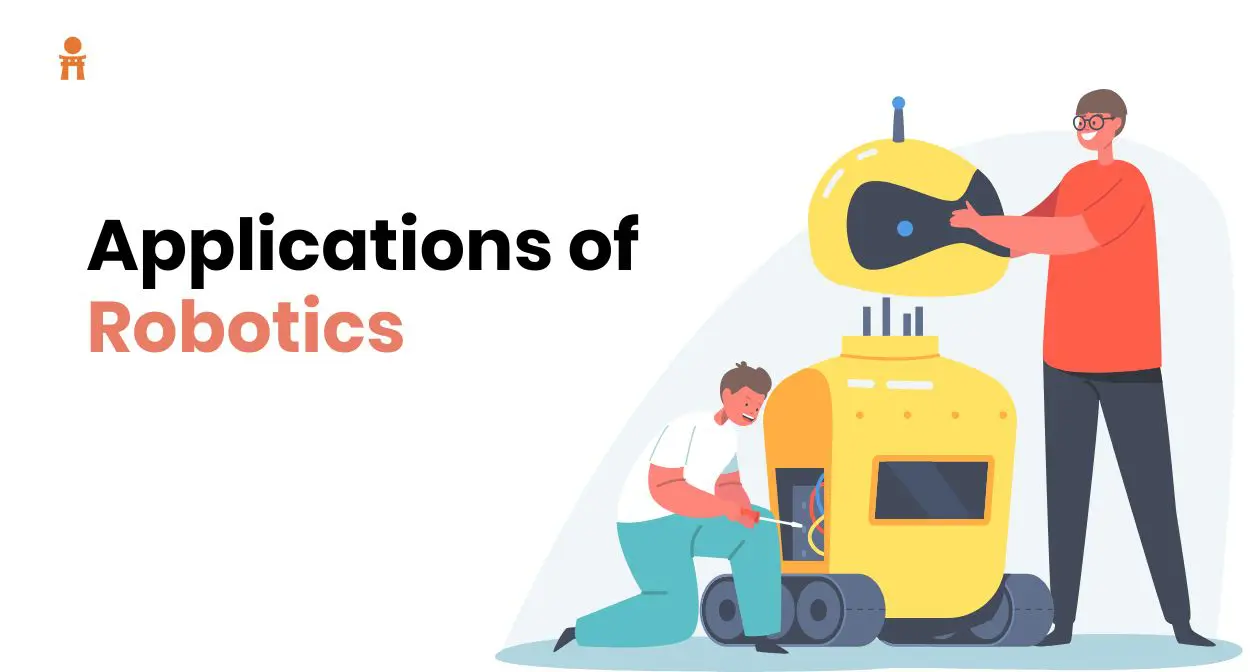The progressive rise of innovative technologies such as collaborative robotics, AI, and machine vision now provides robots with the potential to do tasks that usually require the capabilities of humans, from discrimination to manipulation. What was once thought impossible is now achievable for these high-tech machines.
Robotics applications are normally developed for activities that require delivering specific results without being interrupted.
Robotics and AI
The combination of robotics and AI has created the field of intelligent robotics, which is focused on developing robots that can perform tasks that are typically done by humans. Intelligent robots are equipped with sensors and actuators that allow them to interact with the world around them, and they are powered by AI algorithms that allow them to make decisions and take actions on their own.

Intelligent robots are already being used in a variety of applications, including manufacturing, healthcare, and customer service. For example, robots are used in factories to automate tasks such as welding, assembly, and painting.
In healthcare, robots are used to perform surgery, deliver medication, and provide companionship to patients. In customer service, robots are used to answer questions, provide support, and resolve issues.
How are Robotics Reshaping the Industry? 8 Dynamic Pathways
Robotic automation has gained high recognition in many industries. It has been found that tasks that are hazardous, tedious, or unsanitary are the ones that are best suited for robots. Robotics applications are normally developed for activities that require delivering specific results without being interrupted.
To further explore, let us consider the question: What are robots across multiple industries?
1. Security
As modern criminals become more cunning and sophisticated, the need for enhanced security has become a priority. In response to this crucial demand, robotics companies offer their solutions to safeguard our communities through the use of automated security robots.
Armed with advanced microphones, high-resolution cameras, and reinforced steel exteriors, these automatic sentinels are poised to take on the task of defending us against a wide range of risks including armed robberies, burglaries, fraud, and more.
However, ensuring optimal performance and security for these robot healthguards requires addressing the underlying systems. This is where Clean My Mac comes in as one of the go-to Mac cleaner apps for users trying to reach peak performance and optimal security for their robot guards.
It’s incredibly straightforward to use, making it easy to clean up system clutter. Get rid of unnecessary programs and find different ways to eliminate malicious software in one efficient step. With this powerful Mac cleaner, you can quickly free up space on the Mac to reach its speed booster.
Read more –> AI in Cybersecurity: Revolutionizing threat detection and defense
2. Entertainment
The entertainment industry has seen the utilization of bots to work behind the scenes in support of production. Rather than taking on major roles, they are much more adept at tackling laborious and ongoing tasks – the sort that can be draining for people to endure.
Examples of this could be operating the camera or engineering special effects. This allows creative teams to focus on conceptualization while they leave the monotonous labor to robots.
Autonomous robots can do some of the most hazardous stunt work with ease, bringing action scenes in the movies to life. Even Disney World has begun utilizing these machines, creating a truly magical and memorable experience for its guests.
3. Healthcare
Modern technology has revolutionized healthcare and made life easier for doctors, patients, and real-world prosthetics. Computerized advancements have made a tremendous difference in the industry, with seemingly endless potential applications for medical professionals and those in need of care.
From precise operations to therapy sessions, robots are truly making a difference in the realm of health services. A noteworthy example is the Da Vinci bot which works alongside surgeons during delicate operations on the heart, head, and neck.
Additionally, other automatic forms such as exoskeletons are being created to provide assistance to those recovering from spinal issues, strokes, or other such medical troubles.
4. Space Exploration
Space exploration presents a host of situations where danger poses an insurmountable risk for human astronauts. Taking soil samples from Martian terrain or working to repair a spacecraft while in the depths of space are two examples of such measures requiring an alternate, safer solution.
Thankfully, robotics technology offers the ideal answer – thus eliminating any potential threat to human life. Space organizations, such as NASA, depend a great deal on manufacturing robots and automated vehicles to carry out activities that are impossible for humans.
For example, the Mars Rover is an autonomous bot that moves around the Martian surface, taking photographs of interesting or relevant rock formations. These pictures are then sent back to Earth, allowing NASA experts to investigate them.
5. Food Preparation
For those who need assistance in the kitchen or are tired of endless meal preparation, robotics also offer solutions. Robotic chefs are revolutionizing the culinary world, capable of preparing your favorite dishes with remarkable speed. They offer an impressive selection of recipes that will leave your taste buds amazed.
One notable example is Moley Robotics, which has developed a fully equipped robotic kitchen featuring an advanced, master chef-like robot. This intelligent machine handles all the labor-intensive tasks on your behalf.
Simply choose your desired recipe and provide the robotic machinery with pre-packaged containers containing the necessary ingredients. From there, sit back and let the industrial robot arms work their magic – chances are, you won’t be disappointed.
6. Military
Robots have great use for military operations, either as drones providing enemy surveillance, as well-armed robotic machinery systems confronting adversaries, or as aiding friendly forces. The Ripsaw MS1 is an outstanding example of a combat bot machine used in the military. It has highly sophisticated sensors and powerful weapons systems, without a doubt, a high-speed unmanned vehicle.
Enhancing a military’s operational effectiveness, Themis (Tracked Hybrid Modular Infantry System) offers the versatility to carry out a range of operations such as reconnaissance and heavy payload tasks. These different types of robots give an advantage to troops on the battlefield.
7. Underwater Exploration
For places far too dangerous and hard to reach for humans, manufacturing robots is highly efficient when it comes to exploring subterranean watery realms. Where human beings and even submarines are restricted by their inability to face the intense pressures of the ocean floor, robotic systems show immense promise in both research and data collection efforts.
Unveiling the mysteries of the deep ocean is now achievable with specially designed bots. Controlled by remote operators, these tech marvels can capture images and gather data from depths previously beyond our reach. Subsequently, this type of robotic exploration has shed light on a plethora of aquatic animal and plant life, never before seen by human eyes.
8. Technology
Sure, here is a table that summarizes the different applications of robotics in data science, AI, data analytics, machine learning, and data visualization:
|
Application
|
|
|---|---|
| Data Science | Robots can be used to collect data from the real world, such as images, videos, and audio. They can also be used to process and analyze this data, and to generate insights that can be used to improve products and services. |
| AI | Robots can be used to develop AI algorithms that can learn and make decisions on their own. This can be used to automate tasks, such as fraud detection and customer segmentation. |
| Data Analytics | Robots can be used to process large amounts of data quickly and efficiently. This can be used to create visualizations and analytics that would be too time-consuming or difficult to create manually. |
| Machine learning | Robots can be used to train machine learning models, which can be used to make predictions about future events or to automate tasks. This can be used to improve the efficiency and accuracy of many different processes, such as fraud detection, customer segmentation, and product recommendation. |
| Data visualization | Robots can be used to create interactive visualizations of data. This can help us understand data more easily and make better decisions. |
A Final Word
As demonstrated above – from security guards and chefs to doctor’s assistants and customer service agents – types of robotics have taken up an astonishing variety of roles across many industries.
On top of that, there is a never-ending array of applications for these robotic creations, especially when it comes to taking on tasks that are dangerous or require high precision and repetitiveness, robots are the go-to solution. To top it all off, they have even been adopted in warfare – a testament to their endless utility.
Harnessing the power of technology, robots have shown their need in completing complex and potentially dangerous tasks with ease. With the ongoing progress in AI, these machines’ capabilities are continuing to strengthen and adapt, providing people with aid across various industries.
Written by Henry Rojas




